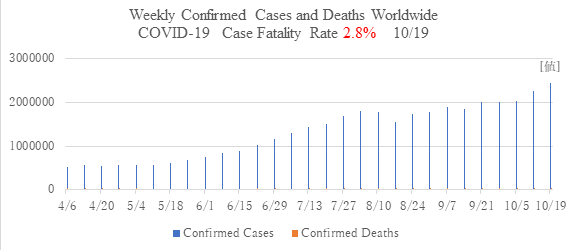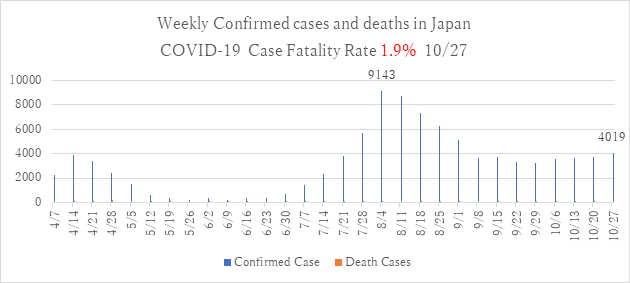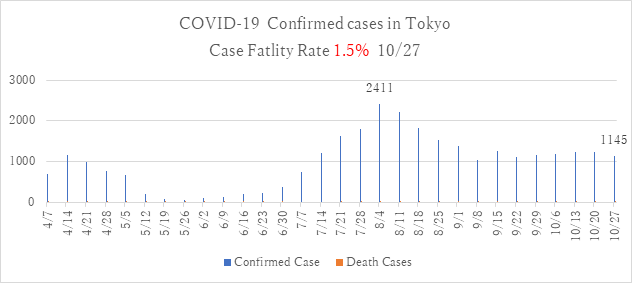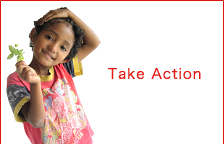SHARE
Services for the Health in Asian & African Regions (SHARE) = SHARE is a citizen sector organization (NGO) that engages in international cooperation mainly through providing health service.
HOME > News > Information of COVID-19(12)
- 【※updated】COVID-19(multi-language)
- Information of COVID-19(15)
- Information of COVID-19(vaccines)
- 《Request to the Government of Japan》Ease the protection of intellectual property rights and promote sharing and cooperating on pharmaceuticals and medical technologies, in order to accelerate efforts to overcome COVID-19 all over the world.
- Information of COVID-19(14)
- Information of COVID-19(13)
- Information of COVID-19(12)
- Information of COVID-19(11)
- SHARE Medical Information Line for Migrants is resumed in Oct.
- Information of COVID-19(10)
Information of COVID-19(12)

Information of COVID-19 (12)by SHARE 2020.11.02
1. Global and Japanese Situation regarding COVID-19
■Confirmed cases and new deaths from COVID-19 worldwide(source: WHO, updated 2020/10/19)Case fatality rate:2.8%

- There are more than 40 million total positive cases of COVID-19 and more than 1,100,000 deaths worldwide, with a case fatality rate of 2.8%. (WHO, updated 2020/10/19)
- Globally, the number of new weekly positive cases is rising again, reflecting a sharp increase in Europe. Meanwhile, the fatality rate is on the decline.
- In the Eastern Mediterranean, African and Western Pacific regions, the trend of new cases is also shifting from decreasing to increasing, albeit gradually.
- In the Americas and Southwest Asia, where the number of new cases is increasing rapidly in India, the number of new cases is larger than in the rest of the world. But the number has peaked and is now on a downward trend. These two regions account for half of the world's positive cases.
- The European region saw three times as many new infections and deaths in October as in April. France, the United Kingdom, Russia, the Czech Republic and Italy all currently have an explosion of infections.
- India, the United States, France, Brazil and the United Kingdom were the countries with the highest number of new cases in the last week of October.
Weekly confirmed cases and deaths of COVID-19 in Japan (updated 2020/10/27)
-Case fatality rate 1.9%
■Weekly confirmed cases and deaths of COVID-19 in Japan (updated 2020/10/27)
- Case fatality rate 1.9%

■Weekly confirmed cases of COVID-19 in Tokyo(updated 2020/10/27)
- Case fatality rate 1.5%

- The downward trend of new positive cases has leveled off in the Tokyo metropolitan area and nationwide, with 500 new cases reported for Japan as a whole and 150-200 new cases in Tokyo each day. This trend is expected to continue.
- New positive cases in the Tokyo metropolitan area and in cities such as Miyagi, Osaka, Hyogo, and Fukuoka continue to be reported.
- In October, the number of new cases increased in Kumamoto, Okinawa, and Hokkaido, which had a particularly marked increase.
- In the Hokuriku, Shikoku and Kyushu regions infections are under control.
2. Drastic Strengthening of Border Measures at Ports and Airports
Ministry of Health, Labour and Welfare (updated 2020/10/06)- All persons entering Japan must stay at a place designated by the quarantine station chief (e.g., home) for 14 days after arrival, use a means of non-public transportation from their arrival point to their place of stay, and register their place of stay and the means of transportation with the quarantine station.
- Those who have stayed in areas subject to refusal of entry to Japan (many countries are subject to this rule) are required to undergo a test for SARS-CoV-2 at the time of entry, to wait in a space at the airport or in a facility designated by the quarantine station until the results of the test are available. They must stay in a secured area for 14 days from the date of entry, even if the results of the test are negative, and will be subject to health verification by a health center during the stay.
- If their test result is positive, the person will be quarantined in a designated institution such as medical facilities, hotels and home.
- Those who departed from an area subject to denial of entry to Japan within the last 14 days and arrived via a different country are also subject to the border measure, but if Japan is only a transit point and they do not enter the country, they are not subject to the measure.
- For 14 days from the day of arrival, travelers must stay at the place designated by the quarantine center chief (such as home, accommodation owned by company, relative's house, friend's house, apartment rented by month, or hotel booked by independently) and they may not go out.
- If you stay at home, it is important to wash your hands frequently, get enough sleep, and take care of your nutrition. If symptoms such as cough or fever occur, you should call the Consultation Center for the Returnees and the appropriate contact persons in advance of visit, and go to the designated medical facility.
- Families and others who must spend time in close proximity with the newly arrived person during the quarantine should try to reduce contact as much as possible, wash their hands frequently, wear masks and limit the number of people they come into contact with if they feel unwell.
- The health center monitoring each arrival will check the health status of the arrived person daily by phone or email for 14 days after arrival in Japan.
- https://www.mhlw.go.jp/stf/seisakunitsuite/bunya/kenkou_iryou/covid19_qa_kanrenkigyou_00001.html#Q3-2 (Japanese)
- https://www.mhlw.go.jp/stf/covid-19/kansenkakudaiboushi-iryouteikyou_00005.html (English)
3. Ten Priority Actions
The Lancet, one of the world's five best-known and most respected medical journals, summarizes the corona control efforts to date and lays out ten priority actions for the future. (updated 2020/10/10)- Track down the origins of the virus in an open, scientific, and unbiased way not influenced by geopolitical agendas.
- Suppress the epidemic through the proven package of non-pharmaceutical approaches (NPIs), as accomplished by several countries, with several in the Asia-Pacific region.
- Base policy-making on objective scientific evidence, and stop politicians and others in positions of power from subverting clinical trials and other scientific protocols.
- Collect and publish timely and internationally consistent data on the state of the pandemic, including humanitarian and economic consequences.
- Ensure universal access to the tools to fight COVID-19, including test kits, therapeutics, and prospective vaccines.
- Secure access for developing countries to financing from international sources, especially from the IMF and World Bank.
- Direct urgent protection towards vulnerable groups, including the elderly, persons in poverty and hunger, vulnerable women, children, persons with chronic diseases and disabilities, the homeless, migrants, refugees, Indigenous Peoples, and ethnic and racial minorities.
- Prepare for a deep restructuring of global finances, including debt relief, new forms of international financing, and reform of monetary arrangements.
- Economic recovery will be based on public-investment-led growth in green, digital, and inclusive technologies, based on the SDGs.
- Support UN institutions and the UN Charter, resisting any moves towards a new Cold War.
Lancet COVID-19 Commission Statement on the occasion of the 75th session of the UN General Assembly
The Lancet COVID-19 Commissioners, Task Force Chairs, and Commission Secretariat
Lancet 2020; 396: 1102-24
Written by Nakasa T, MD, Co-President of SHARE
Dr. Aya Yumino
Dr. Aya Yumino
■【Release】Information of COVID-19(ENGLISH)
■Useful URLs by multi-languages




